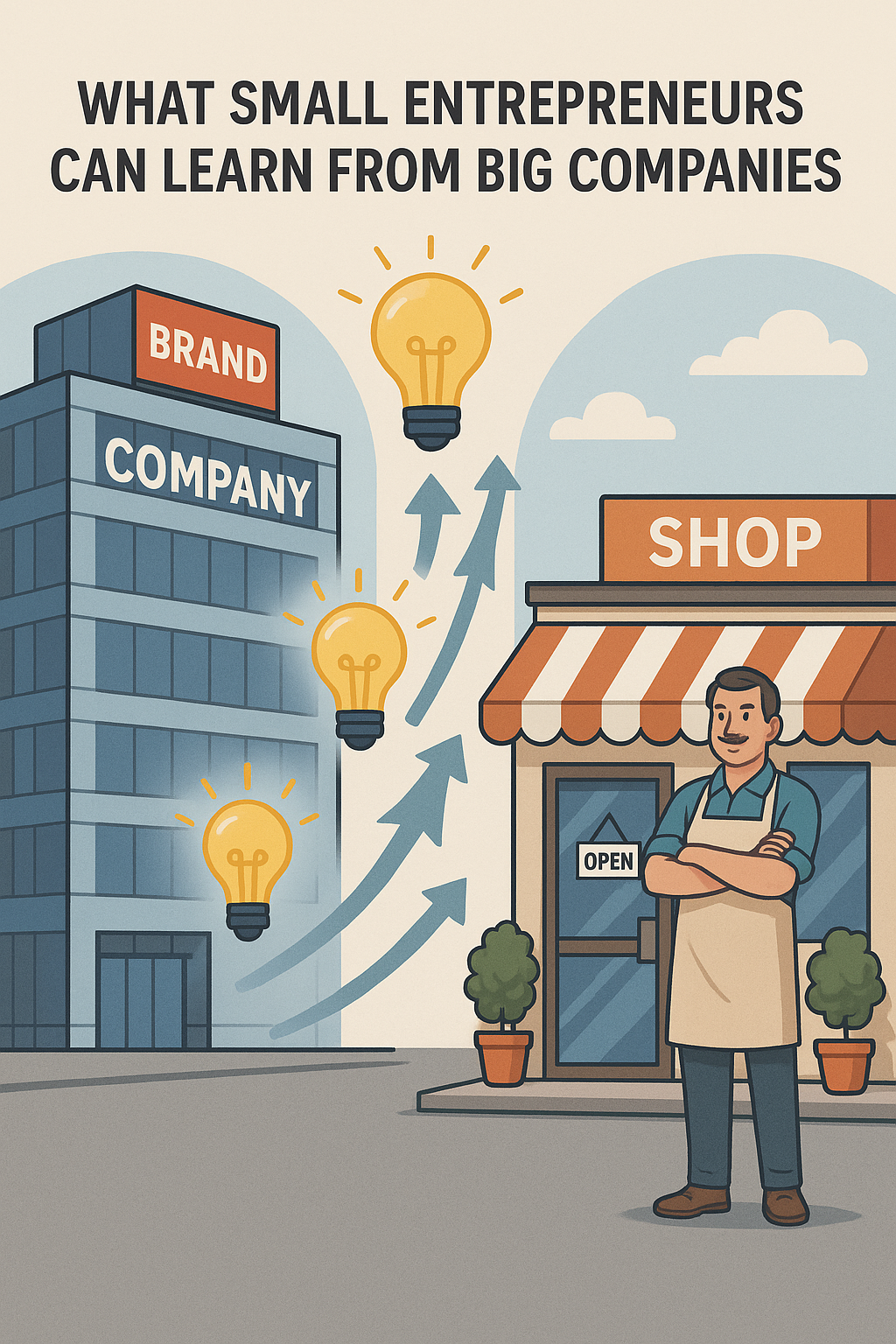Large corporations have the advantage of resources, global reach, and years of experience. But while small entrepreneurs may not have the same scale, they can learn valuable lessons from how big companies operate. By adopting certain strategies used by larger players—adapted to their own scale—small entrepreneurs can grow smarter and faster.
This article will highlight key lessons small businesses can learn from big companies and how to apply them effectively.
Lesson 1: The Power of Branding
Big companies invest heavily in branding because they know it builds recognition and trust. A strong brand creates loyalty and makes products more memorable.
What small entrepreneurs can do:
- Design a professional logo and use consistent colors and fonts.
- Define your brand voice (friendly, professional, creative, etc.).
- Ensure consistency across your website, packaging, and social media.
Even on a small budget, strong branding makes you look credible and professional.
Lesson 2: Focus on Customer Experience
Companies like Amazon and Apple thrive because they prioritize customer experience. Every detail—from website usability to after-sales service—is designed to keep customers satisfied.
Small business application:
- Simplify the buying process.
- Offer quick and friendly customer support.
- Surprise customers with small gestures (thank-you notes, freebies).
Happy customers return and spread the word, helping you grow.
Lesson 3: Data-Driven Decisions
Big companies rely on data to guide strategy. They track customer behavior, market trends, and sales performance before making moves.
How small entrepreneurs can adapt:
- Use free tools like Google Analytics to track website visitors.
- Pay attention to which products sell best.
- Use surveys to ask customers for feedback.
Data doesn’t require expensive systems—it requires curiosity and consistency.
Lesson 4: Building Systems and Processes
Large companies scale because they build repeatable systems. From supply chain management to HR policies, systems ensure efficiency and consistency.
For small businesses:
- Create step-by-step processes for routine tasks (e.g., handling orders, responding to emails).
- Use checklists or project management tools like Trello or Asana.
- Automate repetitive tasks whenever possible.
Strong systems free up time and reduce mistakes.
Lesson 5: Marketing Consistency
Big brands maintain a steady presence. They don’t stop advertising when sales are high—they build long-term recognition.
Small entrepreneur tip:
- Post regularly on social media.
- Send consistent newsletters.
- Keep engaging with your audience, even when business is good.
Consistency builds trust and keeps your business top of mind.
Lesson 6: Innovation and Adaptation
Big companies stay relevant by innovating—Apple launches new products, Netflix adapts to new viewing trends. They constantly evolve.
Small businesses should:
- Watch market trends and adjust quickly.
- Listen to customer needs and update offerings.
- Experiment with new ideas on a small scale before fully committing.
Adaptability is an advantage of being small—you can pivot faster than big companies.
Lesson 7: Invest in People
Big corporations know their success depends on talent. They invest in training, leadership, and culture.
Small entrepreneur approach:
- If you have staff, invest in their growth.
- If you’re solo, invest in your own learning.
- Build relationships with freelancers, mentors, and collaborators.
People are at the heart of every business, no matter the size.
Lesson 8: Long-Term Vision
Big companies don’t just think about next month—they plan for years ahead.
Small entrepreneurs can:
- Set clear short-term and long-term goals.
- Reinvest profits into growth.
- Build a vision that motivates daily actions.
Thinking long term ensures you’re building sustainability, not just short-term gains.
Final Thoughts: Think Big, Act Smart
Small entrepreneurs may not have the budgets of big corporations, but they can adopt the same mindset. By focusing on branding, customer experience, data-driven decisions, systems, marketing consistency, innovation, people, and long-term vision, small businesses can grow stronger and more professional.
The key is to adapt these lessons to your scale—start small, stay consistent, and grow steadily. When you think like a big company but act with the agility of a small one, you create the perfect formula for success.
